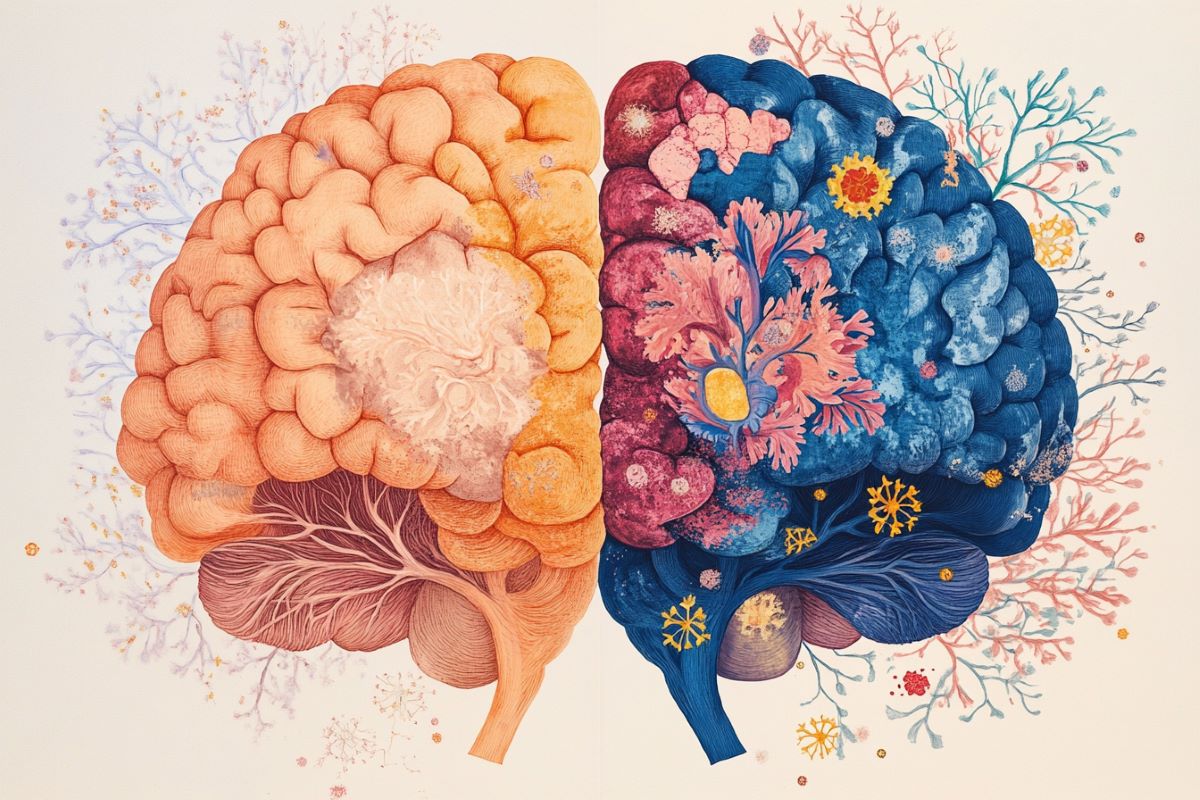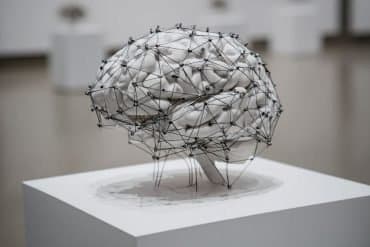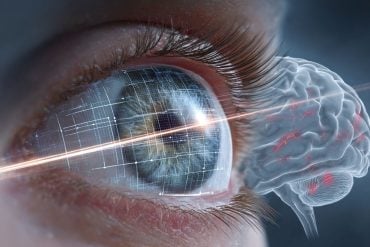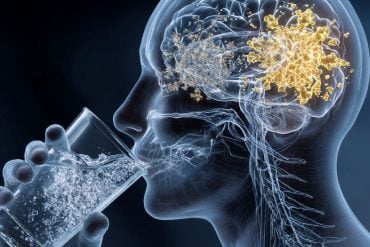Summary: New research shows that female mice expressing only a maternal X chromosome experience faster brain aging and cognitive decline compared to those expressing both maternal and paternal X chromosomes.
The maternal X accelerates aging in the hippocampus, a key region for memory and learning, and silences certain genes essential for brain health. Using CRISPR, researchers reactivated these silenced genes, improving memory in older mice.
These findings suggest that the parental origin of the X chromosome influences brain aging and may explain individual differences in cognitive decline and susceptibility to brain diseases. Researchers hope this insight will inform strategies to slow brain aging and address sex differences in conditions like Alzheimer’s.
Key Facts:
- Brain Aging Link: A maternal X chromosome accelerates aging and impairs memory.
- Gene Silencing Impact: Certain genes on the maternal X are silenced but not on the paternal X.
- Therapeutic Potential: Reactivating silenced genes improved memory in aging female mice.
Source: UCSF
Women are born with two X chromosomes and inherit one from each parent. But in every cell of their body, just one X chromosome is needed – so the other is randomly inactivated. Some cells use only a maternal X chromosome; others rely only on the paternal X.
Now, UC San Francisco researchers have found that when the brain cells of female mice express only a maternal X chromosome, their memory and cognitive skills deteriorate faster than female mice that express both maternal and paternal X chromosomes.

The discovery, which appears Jan. 22 in Nature, could explain the variation in brain aging between the sexes, since males inherit only a maternal X, as well as the variation between individual women.
“These findings raise the possibility that some women who express more of their mom’s X chromosome just by pure chance may have more cognitive impairment with aging or an increased risk for diseases like Alzheimer’s,” said Dena Dubal, MD, PhD, a professor of neurology and the David A. Coulter Endowed Chair in Aging and Neurodegenerative Disease at UCSF, and the senior author of the new paper.
“Ultimately, it could also help us find constructive strategies for slowing brain aging in both sexes.”
X marks the brain
Previous research has hinted that the X chromosome – of which most women have two and most men have just one – is vital to brain health. Mutations in the X chromosome often cause intellectual disability, and women born with just one X chromosome (a diagnosis known as Turner Syndrome), can have cognitive impairments.
X chromosomes, some researchers hypothesize, could help explain sex differences in cognition, verbal memory, or brain disease risk.
“Given the fact that the X chromosome is enriched for brain-related genes, it became very important for us to know what roles it might be playing in brain aging,” said Samira Abdulai-Saiku, PhD, a UCSF postdoctoral fellow and first author of the new work.
Dubal and Abdulai-Saiku were especially interested in whether the origin of the X chromosome – from mom or from dad – mattered to cells. They knew that when egg and sperm cells form, chemical tags are added to certain genes on the chromosomes.
These marks differ depending on whether the chromosome is from the mother (egg) or father (sperm). The marks impact what genes are activated when each chromosome is used in cells.
In the new study, the research team bred female mice either to express only maternal X chromosomes, or a mixture of maternal and paternal X chromosomes.
“Skewing of the X chromosome is common among humans, and there are certainly women who are walking around with much higher or lower levels of maternal X chromosomes than others, just by chance,” said Dubal.
“There has been little research on the potential consequences of this.”
The effect of maternal chromosomes
Female mice with only an active maternal X chromosome, Dubal and Abdulai-Saiku discovered, showed poorer memory and learning abilities as they aged. In the brains of these mice, the maternal X chromosome sped up biological aging in the hippocampus – a brain area crucial for learning and memory.
“What we showed is that these animals’ brains were really aging faster than the brains of their genetically identical sisters who had both mom’s and dad’s X chromosomes turned on,” explained Dubal.
Carrying out detailed analyses of the brain cells, the team was then able to identify certain genes that were completely silenced on maternal X chromosomes but not paternal ones.
When the researchers used CRISPR gene editing technology to activate the silenced genes on maternal X chromosomes in female mice, they became smarter in their old age.
“Together, all these experiments suggested to us that the parental origin of an X chromosome can have a big impact on brain health,” Abdulai-Saiku said.
Evolutionary roots?
The new study was not designed to test exactly why the maternal X chromosome would accelerate brain aging compared to the paternal X chromosome. However, Dubal hypothesized that the genes silenced on the maternal chromosome could convey an advantage earlier in life.
“It may be that this gene expression pattern is actually really beneficial to brain development, but then there is this tradeoff later in life,” she said.
Dubal hopes to continue studying the role of the X chromosome in brain aging, and whether it can explain people’s risk of brain diseases or memory loss.
“The X chromosome you inherited from your mom is turning off genes, accelerating aging, and impairing cognition,” she said. “Can we reverse this?”
Authors: The other authors of the paper were Shweta Gupta, Dan Wang, Francesca Marino, Arturo J. Moreno and Barbara Panning of UCSF and Yu Huang and Deepak Srivastava of UCSF and the Gladstone Institutes.
Funding: Primary funding for the study was by the Primary funding for the study was by the National Institute of Aging (RF1AG079176, RF1AG068325), American Federation for Aging Research, the Bakar Aging Research Institute, and the Simons Foundation (1018027, 811225SPI).
Disclosures: Dena Dubal serves on the Board of the Glenn Medical Foundation, consulted for Unity Biotechnology (unrelated to content of manuscript) and SV Health Investors (unrelated to the content of the manuscript), and serves as an Associate Editor at JAMA Neurology. All other authors declare no competing interests.
About this genetics and brain aging research news
Author: Laura Kurtzman
Source: UCSF
Contact: Laura Kurtzman – UCSF
Image: The image is credited to Neuroscience News
Original Research: Open access.
“The maternal X chromosome affects cognition and brain ageing in female mice” by Dena Dubal et al. Nature
Abstract
The maternal X chromosome affects cognition and brain ageing in female mice
Female mammalian cells have two X chromosomes, one of maternal origin and one of paternal origin. During development, one X chromosome randomly becomes inactivated.
This renders either the maternal X (Xm) chromosome or the paternal X (Xp) chromosome inactive, causing X mosaicism that varies between female individuals, with some showing considerable or complete skew of the X chromosome that remains active.
Parent-of-X origin can modify epigenetics through DNA methylation and possibly gene expression; thus, mosaicism could buffer dysregulated processes in ageing and disease. However, whether X skew or its mosaicism alters functions in female individuals is largely unknown.
Here we tested whether skew towards an active Xm chromosome influences the brain and body—and then delineated unique features of Xm neurons and Xp neurons. An active Xm chromosome impaired cognition in female mice throughout the lifespan and led to worsened cognition with age.
Cognitive deficits were accompanied by Xm-mediated acceleration of biological or epigenetic ageing of the hippocampus, a key centre for learning and memory, in female mice.
Several genes were imprinted on the Xm chromosome of hippocampal neurons, suggesting silenced cognitive loci. CRISPR-mediated activation of Xm-imprinted genes improved cognition in ageing female mice.
Thus, the Xm chromosome impaired cognition, accelerated brain ageing and silenced genes that contribute to cognition in ageing.
Understanding how Xm impairs brain function could lead to an improved understanding of heterogeneity in cognitive health in female individuals and to X-chromosome-derived pathways that protect against cognitive deficits and brain ageing.






